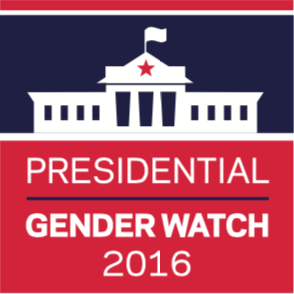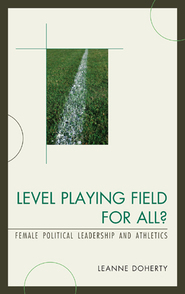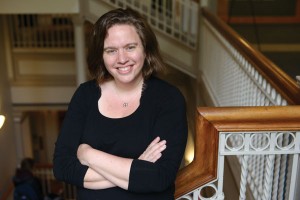Carli Lloyd for President? A Conversation About Women’s Sports and Presidential Politics
 In April 2015, the Barbara Lee Family Foundation (BLFF) and the Center for American Women and Politics (CAWP) launched Presidential Gender Watch 2016, a project to track, analyze, and illuminate gender dynamics in the 2016 presidential election. With the help of expert scholars and practitioners, Presidential Gender Watch worked for 21 months to further public understanding of how gender influences candidate strategy, voter engagement and expectations, media coverage, and electoral outcomes in campaigns for the nation’s highest executive office. The blog below was written for Presidential Gender Watch 2016, as part of our collective effort to raise questions, suggest answers, and complicate popular discussions about gender’s role in the presidential race.
In April 2015, the Barbara Lee Family Foundation (BLFF) and the Center for American Women and Politics (CAWP) launched Presidential Gender Watch 2016, a project to track, analyze, and illuminate gender dynamics in the 2016 presidential election. With the help of expert scholars and practitioners, Presidential Gender Watch worked for 21 months to further public understanding of how gender influences candidate strategy, voter engagement and expectations, media coverage, and electoral outcomes in campaigns for the nation’s highest executive office. The blog below was written for Presidential Gender Watch 2016, as part of our collective effort to raise questions, suggest answers, and complicate popular discussions about gender’s role in the presidential race.
Presidential Gender Watch asked Dr. Leanne Doherty, author of Level Playing Field for All? Female Political Leadership and Athletics, to weigh in on how last weekend’s 2015 World Cup win relates to presidential politics in the 2016 campaign. See our conversation here and share your thoughts in the comments section or on social media.
1. The U.S. women’s World Cup victory last weekend not only inspired the nation, but also served as a reminder of the progress we have yet to make in promoting gender equity in professional sports. Your work demonstrates how gender disparities in sports can decrease women’s status in the social eligibility pool for political leadership. What impact might the current public dialogue over gender equity in World Cup soccer have on public perceptions of gender and leadership? In what ways might this affect women in politics?
We can already see the economic consequences of the victory; Nike’s “American Woman” commercial campaign immediately after the final whistle sounded is a clear signal that companies have heard the call to change the “shrink it and pink it” philosophy of attempting to attract female consumer purchasing power. The final game itself was the most watched soccer game (men’s or women’s) in the history of televised games and The National Women’s Soccer League has signed its first television contract to show games on Fox Sports this summer and fall.
The narrative around gender equity and sports participation sounds different to me now than the narrative we are hearing in the presidential campaign so far. This victory appears to be the tipping point that Title IX advocates envisioned over forty years ago – that sameness is necessary in the discussion of sports, whether that be concerning pay or talent.
I have not heard the same discussion around the current female candidates running for president in 2016. In fact, both Hillary Clinton and Carly Fiorina are running on traditional difference arguments that include focusing on certain women’s policy issues and attempting to demonstrate that they will be different from the status quo, i.e. male candidates. It might be time to for these candidates to look at the success of Senator Elizabeth Warren, who seems to be balancing economic and social policies in a way that other female politicians have not been able to demonstrate in the past.
However, before we declare the sports world post-gendered, this article from EOnline encompasses the paradoxes of successful women athletes as portrayed by the media – you could substitute many female political candidates in these five facts as well.
2. The 2016 candidates all made sure to congratulate the U.S. women’s team on their World Cup victory, but none have weighed in on the debates around gender equity. Do you think that the 2016 presidential candidates should, or can, address the political debates that have accompanied the women’s World Cup celebrations? Why or why not?
Pay equity has been a popular policy discussion over the last few years and will continue to be so as more information about pay disparity in FIFA Soccer tournaments like the World Cup comes to light. Discussions of women and sports participation have also often encompassed sexual orientation and gender identity. These now are political issues with the Supreme Court’s recent ruling to extend marriage rights to same sex couples as an example. However, like many of our political and policy debates, they have a short shelf life, and I am sure by the time debate season rolls around, the candidates will find some other pop culture event that will make it into the discussion.
3. In what ways, if any, do women’s experiences in sports prepare them for navigating electoral politics, especially at the executive level?

Candidates who run for and are elected to executive office tend to have a set of similar characteristics that place them in what is known as the social eligibility pool. These include various socio-economic and experience factors that increase their legitimacy in the eyes of voters, such as having an Ivy League education, a law degree, previous political experience, and perceived political efficacy. Often, female candidates lack some of these factors for implicit and explicit reasons. I argue in my book, Level Playing Field for All? Female Political Leadership and Athletics, that a candidate who may be lacking in characteristics of the social eligibility pool, especially ones like political experience, could use their athletic experience to make up for those perceived deficiencies. Strength, leadership, teamwork, a willingness to see a difficult physical event through, etc. all can be demonstrated through a simple anecdote from a past game or an exciting play in which the candidate once participated. Given the popularity of sports and the prevalence of sporting metaphors in popular culture, candidates who can exhibit such characteristics become more viable candidates as most of the voting population understands the relationship between sports and culture. This could be especially important for the elite female athlete who has her eyes set on running for public office someday.
4. If you had to choose one member of the U.S. women’s national team to run for president of the United States, who would it be? Why?
Without a doubt, Carli Lloyd for sure. Her name recognition is through the roof right now. She demonstrated leadership as captain of the team for numerous games and her post game sound bites were borderline perfect. Who knows, we might be looking at the next Governor of New Jersey.

Dr. Leanne Doherty currently serves as Associate Dean of Academic Affairs for the College of Arts and Sciences at Simmons College. She is primarily responsible for the design and development of new curriculum, implementation of administrative and academic policies and procedures, and coodination efforts to develop new academic programs. In addition to being the Associate Dean, Leanne is an Associate Professor of American Politics in the Department of Political Science and director of the Master in Public Policy Program. After receiving a BA in Government from Clark University, she received her Ph.D. from Northeastern University in 2005 with a concentration in public policy. Professor Doherty’s research focuses on the role that athletics play in political leadership. Her book, Level Playing Field for All? Female Political Leadership and Athletics (Rowman and Littlefield Publishers, Inc, 2011) explores the idea of athletes as elites in American society and how the disparity between male and female athletes decreases women’s status in the social eligibility pool, a key factor in successful achievement of political office. She has also published research on political science and pedagogy in PS: Political Science, Politics and Journal of Political Science Education, and Politics and Gender. Her new research project looks at various state policies concerning “mandated” breastfeeding policy and the role of interest groups and the federal government in changing problem definitions around infant health. Dr. Doherty’s teaching is centered around the American political system, with a concentration on gender and politics, popular culture, and public policy. She was named Professor of the Year in 2008 and received the Dean’s Award for Excellence in Undergraduate Advising in 2009.


